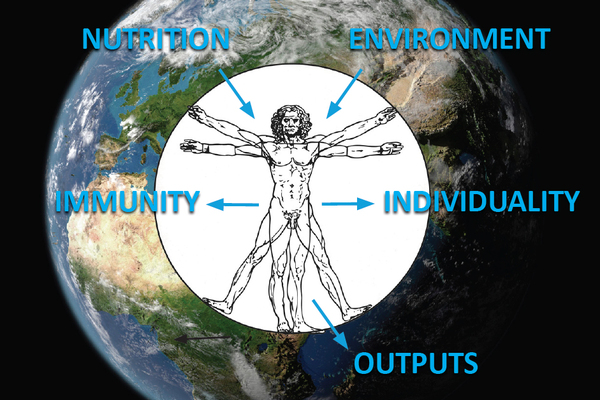Ecology describes the scientific study of the relationships that all living organisms have with each other and their environment.
Ecological Medicine is known better as Functional Medicine in the USA; the differences are minor, apart from the concern for the environment. In the UK and elsewhere it has historically been called AENM – Allergy, Environmental and Nutritional Medicine, after its main components.
Ecological Medicine is firmly rooted in the science of conventional medicine and additionally recognises the key importance of external influences (such as nutrition, environment, e.g. exposure to toxins and lifestyle) and internal influences (such as gut bacteria, genetic disposition, allergy, nutritional deficiencies, biochemical disturbances) in causing disease. Ecological Medicine aims to maintain or restore health by making use of those same influences in a therapeutic way.
Ecological Medicine has proven particularly effective in the understanding, prevention or treatment of the multitude of complex chronic conditions we are facing over recent years including autoimmune and metabolic conditions, e.g. Diabetes, severe allergies, Chronic Fatigue Syndrome (ME/CFS), Multiple Chemical Sensitivity (MCS) to name only a few.
Methods typically used in Ecological Medicine are for instance allergy treatments like elimination diets and food challenges, Provocation/Neutralisation and Enzyme Potentiated Desensitisation (EPD) or Low Dose Allergen Immunotherapy (LDA). Nutritional Therapy is another fundamental part of Ecological Medicine and includes other dietary interventions, oral supplementation and i.v. nutrient therapy. The environmental approach focuses on supporting the body's various pathways of excretion and detoxification, trying to reduce the overall body burden of pollutants that we inevitably accumulate living on Earth these days. These classic methods are then combined with the insights of recent research e.g. in immunotherapy, genomics and epigenetics.
The multitude of different interactions with the environment and the complexity of genetic disposition, means that each patient needs to be assessed thoroughly as a unique individual, making Ecological Medicine the most comprehensive, patient centered form of medicine!

